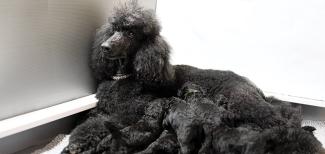Most breeders hope for an uneventful canine pregnancy that results in a smooth delivery of a healthy, full-sized litter. Recognizing the signs and stages of labor can help avert any problems that could sideline those expectations.
“Intervening early rather than too late is important if labor and delivery are not normal,” says Julie T. Cecere, DVM, MS, DACT, a board-certified veterinary reproduction specialist at Virginia-Maryland College of Veterinary Medicine. “When it comes to doing your best to protect the safety of the bitch and her puppies, you should understand the differences between a normal versus an abnormal whelping and be prepared to act fast if something doesn’t seem right.”
Marty Greer, DVM, JD, who has a special interest in reproduction and is co-owner of Veterinary Village in Lomira, Wisconsin, advises breeders to start preparing for puppies from day one via progesterone testing of the bitch. “Timing is everything,” she says. “Progesterone testing allows you to breed bitches at the optimal time. It also allows you to pinpoint an accurate due date, which is so important if an emergency arises during whelping or if you need to schedule a cesarean section.”
With 35 years’ experience breeding Pembroke Welsh Corgis and Danish-Swedish Farmdogs, Dr. Greer shares these tips to help prepare for having puppies:
- Involve your veterinarian from the beginning of the breeding and line up emergency veterinary care in the event you need help in the middle of the night
- Days before the delivery date, bathe your pregnant bitch with a mild shampoo to reduce microorganisms on the skin and coat
- Get plenty of rest yourself to be ready to assist the bitch in whelping puppies
- Ready a vehicle with a full tank of gas in case you have an emergency
- Be prepared to travel with the dam and neonatal puppies by having a safe, comfortable box and blankets for transporting them
Knowing how to assist when puppies are born during stage II labor is helpful should the bitch not do her job after a couple of minutes, says Purina Senior Research Nutritionist Deb Greco, DVM, PhD, DACVIM, a breeder of Standard Poodles. “After a puppy is delivered, remove the membrane covering, clean the face, and suction mucus from the mouth and nose. Use a clean towel to gently dry and rub the puppy to stimulate its breathing. In a few minutes, the pup will begin to cry loudly,” she says.
Being prepared to have puppies doesn’t mean things won’t go wrong. “If at any time during whelping breeders notice black vulvar discharge, moderate to large amounts of fresh blood or are concerned, they should not hesitate to call their veterinarian,” says Dr. Cecere.
Importantly, breeders should understand normal whelping to help them recognize a problem. Every pregnancy is unique. Should an uneventful pregnancy turn into an eventful labor and delivery, be sure you are prepared to ensure the best possible outcome.
Signs & Stages of Labor in the Bitch
| Stage of Labor |
What Happens |
Signs |
Normal |
Abnormal: Consult Your Veterinarian |
| Stage I |
Preparation of birth indicated by the opening of the cervix |
Anorexia, nesting, panting, digging, pacing, and whining
|
Signs should begin 24 hours after the rectal temperature drops to or below 98.5 degrees and can last up to 18 hours
|
-- A temperature drop occurs but there are no signs of labor in 24 hours
-- More than 18 hours pass without a puppy progressing to Stage II
|
| Stage II |
Active labor involving contractions and pushing |
In response to contractions, bitch begins pushing, initiating the onset of Stage II Labor
|
First contractions and pushing can last up to one hour prior to the first puppy. Pushing and/or contractions lasting greater than 30 minutes for subsequent puppies is abnormal
|
-- Greater than 1 hour of active pushing for the first puppy
-- Greater than 30 minutes of active pushing for subsequent puppies
-- Greater than 2 to 3 hours of resting between puppies
-- Significant increase in time between puppy delivery as labor progresses
|
|
Stage III
|
Passage of the placenta |
Passage of the placenta |
Usually occurs immediately after each pup is whelped but can by delayed by the immediate passage of another puppy
|
-- Foul smelling, purulent discharge after whelping
|
Sources: Dr. Julie T. Cecere, DVM, MS, DACT, and Dr. Alyssa Helms, DVM, of Virginia-Maryland College of Veterinary Medicine

